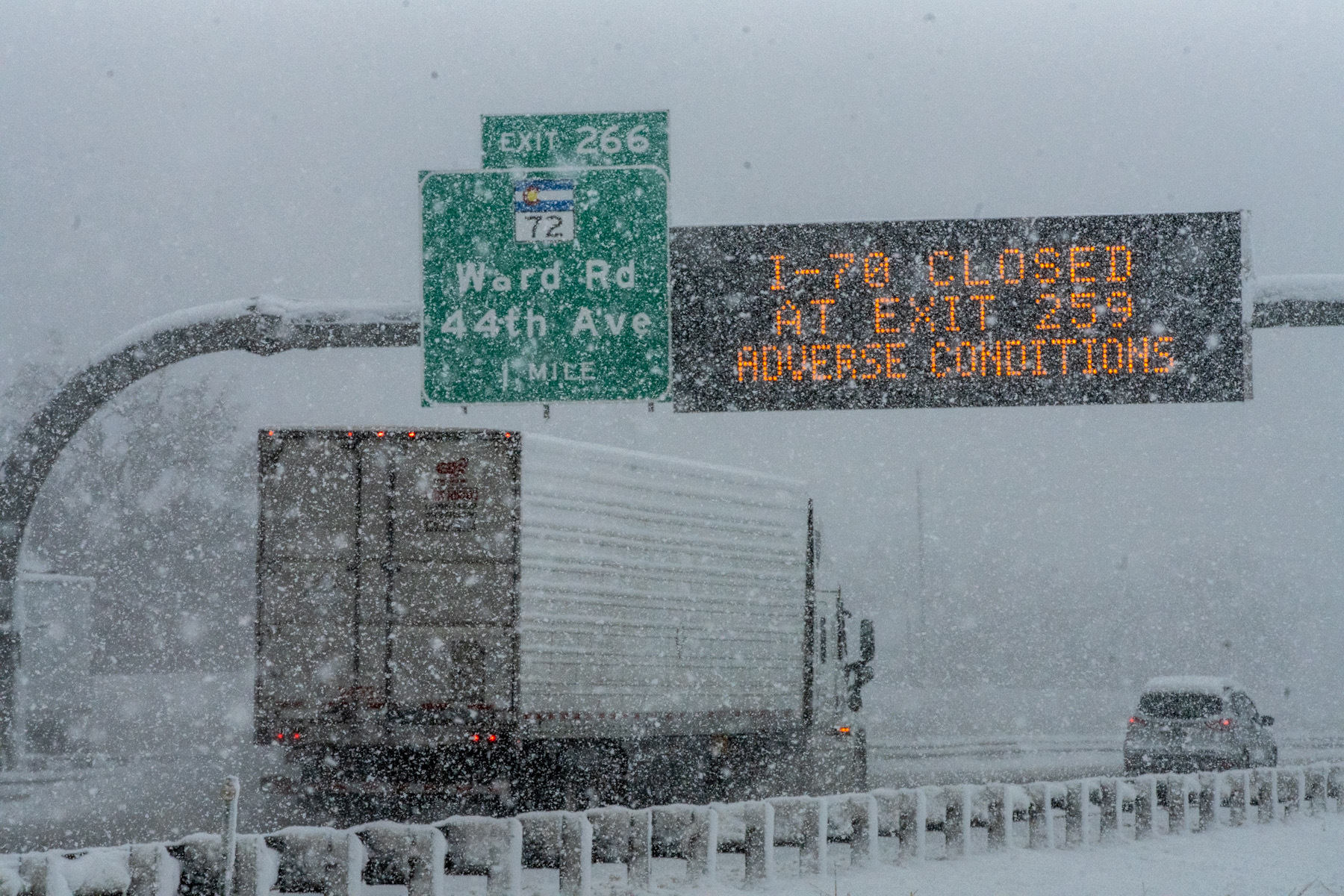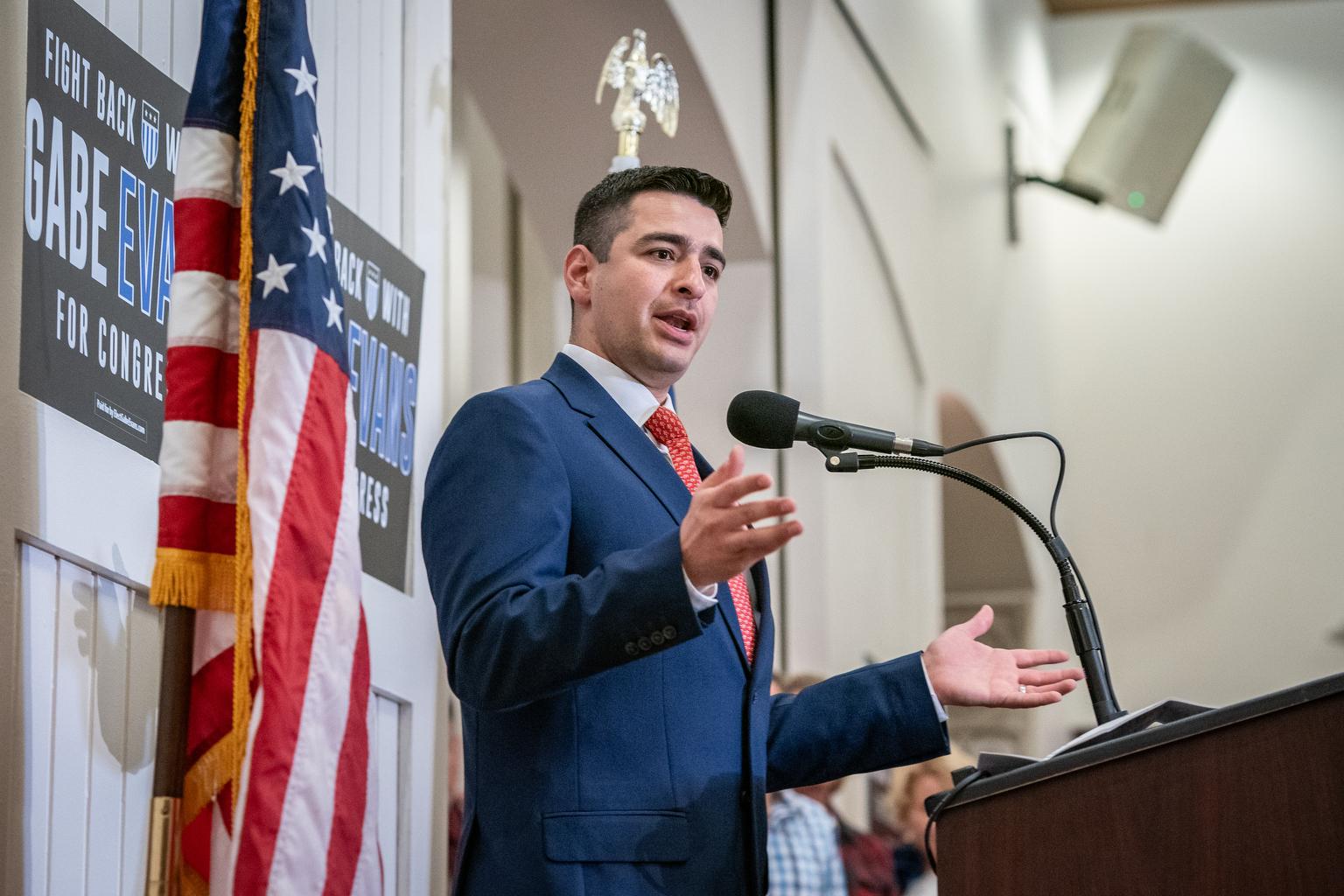
Updated at 10:11 a.m. on Jan. 22, 2025
In just the first few weeks of the new year, overturned and spun-out semi trucks have already caused several multi-hour delays on I-70 near Vail Pass — and Vail Mayor Travis Coggin has had enough.
According to Coggin, gridlock on I-70 has a “huge impact on the [Vail] community.”
“When Vail Pass closes eastbound, where do you think all those cars go? They all get pushed off I-70, and they all get pushed into all of the neighborhoods in our community, Coggin told CPR News. ”Vail becomes just a giant parking lot while we wait for these things to clear out.”
Coggin said the solution is to raise chain law fines. In a town council meeting earlier this month, Coggin told fellow council members that he wanted to raise the $500 fine for violations to $20,000.
“Five hundred bucks clearly does not change anyone's mind,” Coggin said in the meeting. “I mean, it's offensive to our community and I would like to see if we can get Eagle, Summit, Clear Creek, Jefferson, Lake, and Pitkin Counties — including every other municipality in between who's on I-70 — because there needs to be [license] points or there needs to be a $20,000 fine.”
Greg Fulton, the president of the Colorado Motor Carriers Association, said it isn’t that truck drivers don’t care about putting chains on or that they’re ignoring CDOT alerts. He said a bigger issue is that there aren’t enough safe chain-up stations along the I-70 corridor. CDOT currently has 21 of those stations along the interstate.
“It's a more complex problem than saying, ‘Okay, let's increase fines and penalties,’” Fulton said “What we need to do, and I think that people are missing, is we need to create the conditions for a safe environment and also the ability for compliance to occur… These [drivers] want to get home to their family, too.”
The state’s made changes to protect drivers, but enforcement isn’t perfect
Colorado updated and expanded its chain law just last year. The law, which previously required only commercial semi-trucks to carry tire chains from September to May when traveling on I-70, now requires all drivers — not just commercial drivers — to carry proper winter traction equipment during the winter months. This could include snow tires, chains or all-season tires.
The fines for not following those rules can cost commercial drivers $100 for not carrying traction equipment, $500 for not chaining up and $1,000 for blocking roadways as a result of not chaining up. All of those penalties also carry additional surcharges. Passenger vehicles face a $50 fine for non-compliance, plus a $17 surcharge.
A separate Senate bill also updated the routes where commercial truck drivers are required to carry chains. In addition to I-70, tractor-trailers are now required to carry chains on six additional roadways.
The Colorado Department of Transportation typically alerts drivers when chains are required by turning on blinking electronic signs along I-70. According to a spokesperson with the transportation authority, it will enact the chain law “based on weather information received from one of our 150+ weather stations — this call is made based on friction (or the loss of it).”
There is a chain-up station for motorists near Vail, at Mile Post 178 and 185 eastbound and 182 westbound. But Coggin said some truck drivers will ignore the alerts and keep driving until they get stuck or are stopped by authorities.
“The cost of getting all of [the traffic] cleared out, and the additional resources from the police, the fire department, whoever it might be, it's just a huge impact on the community from these bad actors who are breaking the law,” Coggin said. “So I threw out $20,000 just because it's a big number. I'm not saying that's the right number, but what we have currently clearly isn't a deterrent and it's something we need to address for the safety of our community and just for interstate commerce, traffic and quality of life.”
Who is actually in charge of chain-ups?
Earlier this month, Vail Pass was closed for more than three hours after more than a dozen tractor-trailers became stuck. According to the State Patrol, many of the trucks appeared to have entered the pass without tire chains. While a spokesperson for CDOT described conditions on the interstate as treacherous, the agency acknowledged that communication issues delayed chain law alert, causing it to go out after the trucks had already passed the chain-up stations.
Chain law penalties are handled by law enforcement groups, including the Colorado State Patrol or local police and sheriff’s departments. CDOT has no way of imposing penalties on drivers in violation.
According to State Patrol Captain John Hahn, troopers issued just under 1,200 citations to truck drivers over the last year for not carrying chains or not using chains when the chain law was in effect.
“It could be a blue sky day and [truck] drivers are still required to carry chains,” Hahn told CPR News. “We start in early September doing enforcement operations in the high county — it’s equal parts enforcement and education.”
Coggin said he has spoken with state representatives, including Rep. Joe Neguse, about the issue. He says he also plans on writing a letter to Governor Jared Polis.
“I am going to beat on this drum until something changes,” Coggin said.
Shelby Wieman, a spokesperson for Gov. Polis’s office told CPR News, “improving road safety is part of Governor Polis’s plan to make Colorado one of the top ten safest states in the nation and the Governor is open to discussions on how Colorado can ensure safer travel for Coloradans and visitors."
CPR News has reached out to Neguse’s office, but it has not yet commented on the matter.









